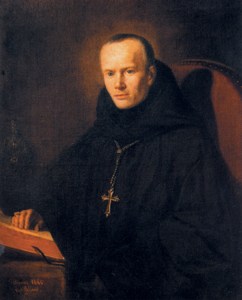
Three years of famine, three months of defeats, three days of pestilence: the choice given to the guilty David between these three measures of expiation shows them to be equivalent before the justice of God. The terrible scourge which makes more havoc in three days than would famine or a disastrous war in months and years, showed in the fourteenth century that it kept its sad pre-eminence: the Black Death covered the world with a mantle of mourning, and robbed it of a third of its inhabitants. Doubtless the world had never so well merited the terrible warning: the graces of sanctity poured in profusion on the preceding century had but checked for a while the defection of the nations. Every embankment being now broken down, entrance was given to the irresistible tide of schism, reform and revolution by which the world must die. Nevertheless God has mercy as long as life lasts, and while striking sinful mankind, He gave them at the same time the Saint predestined to appease His vengeance.
At his birth he appeared marked with the cross. When a young man he distributed his goods to the poor, and leaving his family and country, became a pilgrim for Christ’s sake. Going to Italy to visit the sanctuaries, he there found the cities devastated by a terrible plague. Roch took up his abode among the dead and dying, burying the former and healing the latter with the sign of the cross. Himself stricken with the evil, he hid himself so as to suffer alone; and a dog brought him food. When cured by God he returned to Montpellier, his native town, it was only to be there seized as a spy and thrown into prison where he died after five years. Such are thy dealings with your elect, O Wisdom of God! But no sooner was he dead, than prodigies burst forth, making known his origin and history, revealing the power he still enjoyed of delivering from pestilence those who had recourse to him.
The reputation of his influence, increased by fresh benefits at each visitation of plague, caused his cultus to become popular. Hence although the feast of Saint Roch is not universal, this short notice was due to him. It will be completed by the following legend and prayer borrowed from the proper office for certain places in the supplement of the Roman Breviary:
Roch was born at Montpellier. He showed his great love for his neighbor, when a cruel pestilence ravaged the length and breadth of Italy; leaving his native country he undertook a journey through Italy, and passing through the towns and villages, devoted himself to the service of the sick, not hesitating to lay down his life for his brethren. Miraculous cures bore witness how pleasing to God was the zeal of the holy man. For by the sign of the Cross he saved many who were in danger of death through the plague, and restored them to perfect health. He returned to his own country, and, rich in virtues and merits, died a most holy death. He was honored by the veneration of the faithful immediately after his death. It is said their devotion was greatly increased at the Council of Constance, when, in order to avert the pestilence that threatened them, the image of St. Roch was, with the approbation of the bishops, carried solemnly through that town followed by the whole people. Thus devotion to him has spread in a wonderful way through the whole world and he has been piously declared the universal protector against contagious diseases. Having carefully considered all this, Pope Urban VIII allowed his feast to be celebrated with an ecclesiastical office in those places where there are churches dedicated to God under the invocation of St. Roch.
PRAYER
We beseech thee, O Lord, protect Thy people in Thy unceasing goodness; and through the merits of blessed Roch, preserve them from every contagion of soul and body. Through the same etc.
=======
This text is taken from The Liturgical Year, authored by Dom Prosper Gueranger (1841-1875)

Dom Gueranger
